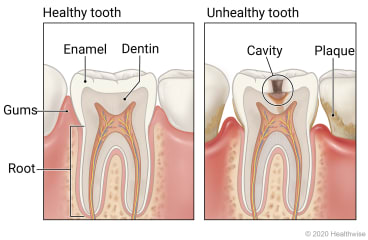
Overview
Tooth decay is damage to a tooth caused by plaque. Plaque is a thin film of bacteria that sticks to the teeth above and below the gum line. If plaque isn't removed from the teeth, it can build up and harden into tartar. The bacteria in plaque and tartar use sugars in food to make acids. These acids can cause tooth decay and gum disease.
Any part of your tooth can decay, from the roots below the gum line to the chewing surface. Decay can affect the outer layer (enamel) or inner layer (dentin) of your teeth. The deeper the decay, the worse the damage.
Untreated tooth decay will get worse and may lead to tooth loss. If you have a small hole (cavity) in your tooth, your dentist can repair it by removing the decay and filling the hole. If you have deeper decay, you may need more treatment. A very badly damaged tooth may have to be removed.
Follow-up care is a key part of your treatment and safety. Be sure to make and go to all appointments, and call your dentist if you are having problems. It's also a good idea to know your test results and keep a list of the medicines you take.
How can you care for yourself at home?
- Take an over-the-counter pain medicine, such as acetaminophen (Tylenol), ibuprofen (Advil, Motrin), or naproxen (Aleve). Be safe with medicines. Read and follow all instructions on the label.
- Do not take two or more pain medicines at the same time unless the doctor told you to. Many pain medicines have acetaminophen, which is Tylenol. Too much acetaminophen (Tylenol) can be harmful.
- Put ice or a cold pack on your cheek over the tooth for 10 to 15 minutes at a time. Put a thin cloth between the ice and your skin.
How can you prevent it?
- Brush your teeth when you wake up and right before you go to sleep. Use fluoride toothpaste. Floss once a day.
- See your dentist for checkups once or twice a year so problems can be found early.
- Eat healthy foods. These include fruits, vegetables, lean proteins, whole grains, and low-fat dairy products.
- Avoid foods with added sugar, especially certain cereals, desserts, candy, and raisins.
- If you smoke, quit or cut back as much as you can.
- Ask your dentist about fluoride treatments or sealants.
When should you call for help?
Call 911 anytime you think you may need emergency care. For example, call if:
- You have trouble breathing.
Call your dentist now or seek immediate medical care if:
- You have new or worse symptoms of infection, such as:
- Increased pain, swelling, warmth, or redness.
- Red streaks leading from the area.
- Pus draining from the area.
- A fever.
Watch closely for changes in your health, and be sure to contact your doctor if:
- You do not get better as expected.
Where can you learn more?
Go to http://www.healthwise.net/patientEd
Enter F057 in the search box to learn more about "Tooth Decay: Care Instructions".
Current as of: August 6, 2023
Author: Healthwise Staff
Clinical Review Board
All Healthwise education is reviewed by a team that includes physicians, nurses, advanced practitioners, registered dieticians, and other healthcare professionals.

